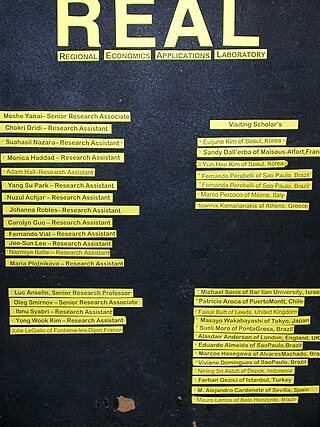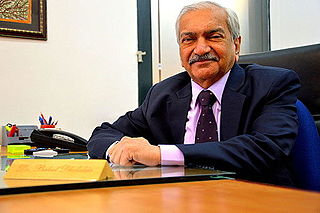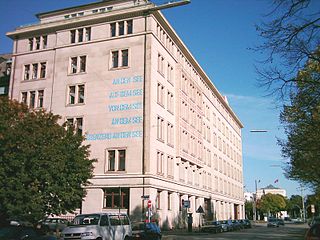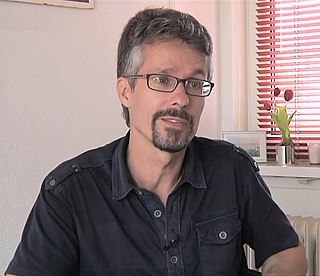Regional science is a field of the social sciences concerned with analytical approaches to problems that are specifically urban, rural, or regional. Topics in regional science include, but are not limited to location theory or spatial economics, location modeling, transportation, migration analysis, land use and urban development, interindustry analysis, environmental and ecological analysis, resource management, urban and regional policy analysis, geographical information systems, and spatial data analysis. In the broadest sense, any social science analysis that has a spatial dimension is embraced by regional scientists.

Economic geography is the subfield of human geography which studies economic activity and factors affecting them. It can also be considered a subfield or method in economics. There are four branches of economic geography. There is, primary sector, Secondary sector, Tertiary sector, & Quaternary sector.

In general, a rural area or a countryside is a geographic area that is located outside towns and cities. Typical rural areas have a low population density and small settlements. Agricultural areas and areas with forestry typically are described as rural. Different countries have varying definitions of rural for statistical and administrative purposes.
In economics, an input–output model is a quantitative economic model that represents the interdependencies between different sectors of a national economy or different regional economies. Wassily Leontief (1906–1999) is credited with developing this type of analysis and earned the Nobel Prize in Economics for his development of this model.

William Jack Baumol was an American economist. He was a professor of economics at New York University, Academic Director of the Berkley Center for Entrepreneurship and Innovation, and Professor Emeritus at Princeton University. He was a prolific author of more than eighty books and several hundred journal articles.
Masahisa Fujita is a Japanese economist who has studied regional science and Urban economics and International Trade, Spatial Economy. He is a professor at Konan University and an adjunct professor at Institute of Economic Research, Kyoto University.
Articles in economics journals are usually classified according to JEL classification codes, which derive from the Journal of Economic Literature. The JEL is published quarterly by the American Economic Association (AEA) and contains survey articles and information on recently published books and dissertations. The AEA maintains EconLit, a searchable data base of citations for articles, books, reviews, dissertations, and working papers classified by JEL codes for the years from 1969. A recent addition to EconLit is indexing of economics journal articles from 1886 to 1968 parallel to the print series Index of Economic Articles.
Regional economics is a sub-discipline of economics and is often regarded as one of the fields of the social sciences. It addresses the economic aspect of the regional problems that are spatially analyzable so that theoretical or policy implications can be the derived with respect to regions whose geographical scope ranges from local to global areas.

Brian Joe Lobley Berry is a British-American human geographer and city and regional planner. He is Lloyd Viel Berkner Regental Professor in the School of Economic, Political and Policy Sciences at the University of Texas at Dallas. His urban and regional research in the 1960s sparked geography’s social-scientific revolution and made him the most-cited geographer for more than 25 years.
Spatial inequality refers to the unequal distribution of income and resources across geographical regions. Attributable to local differences in infrastructure, geographical features and economies of agglomeration, such inequality remains central to public policy discussions regarding economic inequality more broadly.

The Regional Economics Applications Laboratory (REAL) at the University of Illinois at Urbana-Champaign is a regional science research center for advanced graduate students in the fields of economics, geography, urban and regional planning, computer science and mathematics. Professor Geoffrey J.D. Hewings, one of its founders, served as its director until 2016. Professor Sandy Dall'erba has been its director since 2016.
Rural economics is the study of rural economies. Rural economies include both agricultural and non-agricultural industries, so rural economics has broader concerns than agricultural economics which focus more on food systems. Rural development and finance attempt to solve larger challenges within rural economics. These economic issues are often connected to the migration from rural areas due to lack of economic activities and rural poverty. Some interventions have been very successful in some parts of the world, with rural electrification and rural tourism providing anchors for transforming economies in some rural areas. These challenges often create rural-urban income disparities.

Bakul Harshadrai Dholakia is the former Director of IIM Ahmedabad (2002–2007). Prior to that, he was the Dean at Ahmedabad (1998–2001) and a professor in Economics He was also the Director General of International Management Institute, New Delhi. Prior to joining IMI New Delhi, he was the Director of Adani Institute of Infrastructure Management and Gujarat Adani Institute of Medical Sciences, Bhuj.

The National Library of Economics is the world's largest research infrastructure for economic literature, online as well as offline. The ZBW is a member of the Leibniz Association and has been a foundation under public law since 2007. Several times the ZBW received the international LIBER Award for its innovative work in librarianship. The ZBW allows for access of millions of documents and research on economics, partnering with over 40 research institutions to create a connective Open Access portal and social web of research. Through its EconStor and EconBiz, researchers and students have accessed millions of datasets and thousands of articles. The ZBW also edits two journals: Wirtschaftsdienst and Intereconomics.
Karen Rosel Polenske is an American regional economist specialized in energy, environmental, and infrastructure analyses, and input-output accounts and models, particularly at the subnational scale. She is currently the Peter de Florez Professor of Regional Political Economy at the Massachusetts Institute of Technology (MIT).

Jeroen Cornelis Johannes Maria van den Bergh is an environmental economist of Dutch origin. As of January 2015 he was ICREA Research Professor at Universitat Autònoma de Barcelona and Deputy Director for Research of its Institute of Environmental Science and Technology, and professor of Environmental and Resource Economics at VU University Amsterdam.
The Regional Research Institute (RRI) at West Virginia University is a university-wide regional science research center for graduate students and faculty members in the fields of economics, resource economics, geography, history and sociology. Professor William H. Miernyk, a regional economist trained at Harvard, came to West Virginia University and founded RRI and served as the 1st Director. Since its opening in 1965, the Regional Research Institute has helped scholars do research. For numerous individuals, both at West Virginia University and elsewhere, it has provided crucial encouragement, stimulation, and opportunities. Its programs involve faculty members, graduate students, and an extensive network of scholars in the United States and abroad.

Land change models (LCMs) describe, project, and explain changes in and the dynamics of land use and land-cover. LCMs are a means of understanding ways that humans change the Earth's surface in the past, present, and future.

Manfred M. Fischer is an Austrian and German regional scientist, Emeritus Professor of economic geography at the WU-Vienna University of Economics and Business, and Adjunct Professor at the Institute of Geographic Sciences and Natural Resources Research, Chinese Academy of Sciences in Beijing.
Thierry Mayer is a French economist and Professor of Economics at Sciences Po. He belongs to the most frequently-cited economists in the field of international trade. In 2006, Mayer and Etienne Wasmer were awarded the Best Young Economist of France Award by Cercle des économistes and Le Monde.









